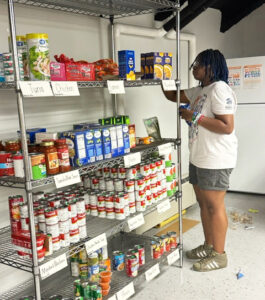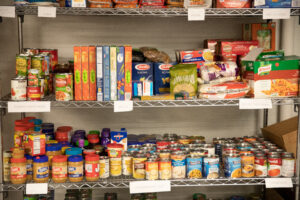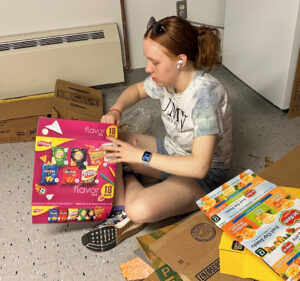Tamara Garrett ’23 arranges boxed macaroni and cheese, cans of soup, and packaged snacks on shelves. With the fall semester underway at the University of Mary Washington, she wants to ensure that the Gwen Hale Resource Center (GHRC) is fully stocked.

“Most people don’t like to ask for help, but we want students to know that no matter what they need, Mary Washington has resources available for them,” said Tamara, who graduated in May. Now working on the UMW campus as part of AmeriCorps, she’s focused on alleviating food insecurity among college students.
Years in the making, GHRC began on a much smaller scale to address that very issue, thanks to a caring UMW administrator who noticed students who didn’t have enough to eat. Members of the Mary Washington community banded together, donating funds totaling $9,000 to open and operate a two-room food pantry in the attic of Lee Hall in 2019, joining other public and private colleges and universities across Virginia that have developed similar programs. Committed to carrying out Gwen Hale’s legacy, the University renamed the space in her honor after she passed away in 2021.
“So many students were coming to me and saying they had no laundry detergent, no winter coats, no clothing for interviews or student teaching, and no money for food,” said Dr. Hale, then director of UMW’s Writing Center, when GHRC first opened. “I figured if these students had the guts to come to me, how many did not?”

That’s what Professor of Sociology Leslie Martin, who now runs GHRC, sought to figure out. She and her students administered two campus-wide surveys, receiving several hundred responses. More than 20% of students indicated they struggled with some level of food insecurity, while at least 11% said they frequently had to skip meals for financial reasons.
Additionally, a 2019 study by the Government Accountability Office found that an estimated 30% of college students nationwide are food insecure, a problem that has only been exacerbated because of the pandemic. Hundreds of food pantries have sprung up on college campuses to help answer the call.
“The goal of an institution cannot happen if people are hungry or can’t get their basic needs met,” said Alexanna Hengy ’17, an AmeriCorps member also volunteering at GHRC. The resource center serves a full spectrum of students, she said, from those who just need a snack between classes to those who don’t know where their next meal is coming from.
Financial donations from alumni, faculty, staff and community members have helped get GHRC up and running. Volunteers from Mary Washington and the Fredericksburg community keep it stocked with fresh produce, pantry staples, clothing, toiletries and more, which students can pick up for free. While the resource center maintains the anonymity of those who use it, more than 1,000 visits have been logged since 2021.

Nicole Ford ’21, who worked in the Writing Center as a student, decided to honor Dr. Hale by raising more than $1,300 for the resource center. “My fellow consultants and I were devastated when Gwen passed away. These funds are a testament to the impact she made at UMW,” said Nicole, who appreciates that GHRC provides “students who are struggling a discreet way to access basic needs.”
Professor of Economics Robert Rycroft had never considered food insecurity an issue among his students until Dr. Hale’s advocacy persuaded him to make a gift toward the resource center. “We were taking care of our own, and a request from Gwen just could not be ignored,” said Dr. Rycroft, who has also donated food. “Her commitment to UMW students was genuine and total, and I wanted to support my good friend’s efforts.”
Junior Meghan McAndrew first learned about GHRC through the student-run service program COAR. Now, in addition to volunteering, she has occasionally gotten items there. “I’ve been able to direct friends at other schools to seek out similar resources,” Meghan said. “College is expensive, and it’s so helpful to have these necessities accessible on campus.”
Make a gift (include “Gwen Hale Resource Center” as your designation) or donate goods to the Gwen Hale Resource Center.
Article written by Assistant Director of Advancement Communications Jill Graziano Laiacona ’04. Former Office of University Advancement intern Ellis Winfree ’23 also assisted in the reporting and writing of this story.
Leave a Reply